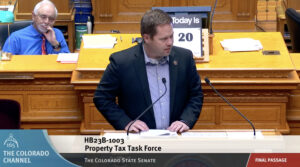Colorado legislative and organizational leaders on Wednesday announced their appointments to the newly formed Commission on Property Tax — a group that includes the CEO of the Colorado Chamber of Commerce, an official with the Colorado Association of Realtors and more Republican elected officials than elected Democrats.
The commission, created through a bill passed in the recently completed legislative special session, will have just three months to study and recommend fixes to one of the most vexing issues in Colorado politics — the state’s property-tax system. With an initial report from the panel due to the General Assembly and Gov. Jared Polis by March 15, legislators then will have less than two months to consider potential major policy overhauls before the 2024 regular session ends, which will happen no later than May 8.
The effort comes after homeowners across Colorado got notices this year that valuations of their properties and the associated property-tax bills for their houses are rising by an average of more than 40% next year, adding to the state’s existing affordable-housing crisis. Commercial property owners in most parts of the state are seeing similar hikes, which affect both the owners of such properties and the tenants who are paying higher rents because of the spikes.
After voters soundly rejected Proposition HH — an initiative that sought to lower property-tax valuations and assessment rates in exchange for a lifting of the Taxpayer’s Bill of Rights revenue cap — Polis called a special session to try to give property owners relief. But while homeowners will get a slight decrease in assessment rates and have $55,000 knocked off their valuations because of the session, the Legislature offered no help to commercial property owners.
Creation of the Commission on Property Tax
Legislators wrote and rewrote House Bill 1003, sponsored by Democratic Rep. Marc Snyder of Manitou Springs, before and during the four-day special session last month, trying to massage the structure and membership of a commission to look at property taxes in the big picture. The process led to a rare legislatively created commission that will feature equal appointments from the minority and majority caucuses, and it was trying enough that co-sponsoring Sen. Kyle Mullica, D-Federal Heights, said in the Senate that he’d never run another task-force bill.

Colorado state Sen. Kyle Mullica speaks in the Senate in November on his bill to create the Commission on Property Tax.
In what may be a nod to the difficulty it took just to assemble the commission, none of the bill’s primary sponsors — Snyder, Mullica or Senate President Steve Fenberg, D-Boulder — will sit on the new commission. Instead, Capitol Republicans will be represented by Sen. Mark Baisley of Woodland Park and Rep. Lisa Frizell of Castle Rock, a former Douglas County assessor, and Democrats will have Sen. Chris Hansen of Denver and Rep. Chris deGruy Kennedy of Lakewood, two authors of the bill that put Prop HH on the ballot.
Each caucus leader also appointed a county commissioner from their party to the commission — Democrats Andy Kerr of Jefferson County and Tamara Pogue of Summit County and Republicans Lori Laske of Alamosa County and Chris Richardson of Elbert County. But Polis, a Democrat, used his two appointments to put two more GOP elected officials on the commission — Mesa County Commissioner Cody Davis and Weld County Assessor Brenda Dones.
A variety of non-elected appointees
Two business leaders will serve on the body — Colorado Chamber President/CEO Loren Furman, appointed by Senate Minority Leader Paul Lundeen, R-Monument, and Sean Dougherty, a Fort Collins Realtor and former Colorado Association of Realtors vice president, appointed by House Minority Leader Mike Lynch, R-Wellington. Fenberg also appointed Kevin Vick, a Colorado Springs high school teacher and vice president of the Colorado Education Association, while House Speaker Julie McCluskie, D-Dillon, appointed Jonathan Cappelli, executive director of the Neighborhood Development Collaborative, which works to build lower-priced homes.
Rounding out the appointments are two people designated in the bill to serve on the commission — Ann Terry, executive director of the Special District Association of Colorado, and JoAnn Groff, property tax administrator in the Colorado Department of Local Affairs. Also, the Colorado Municipal League appointed Broomfield Mayor Guyleen Castriotta and the Colorado State Fire Chiefs appointed West Metro Fire Protection District Assistant Chief Bob Olme, leaders of those organizations told The Sum & Substance. And the Colorado Association of School Executives appointed Brett Johnson, the chief financial officer for Aurora Public Schools, according to the news site Colorado Politics.
McCluskie said in a news release that her appointees are aligned with legislative Democrats’ desire to ensure help for the variety of Coloradans dealing with the spike in property taxes, ranging from residents of mountain towns to people in low-income communities.
“Addressing the rising cost of living is a top priority for Colorado Democrats, and this commission is an important step to making it easier to not only live in our beautiful state but thrive,” she said.
Business interest in the Commission on Property Tax

Loren Furman is president and CEO of the Colorado Chamber of Commerce.
Furman noted that the work of the commission will have broad impacts on Colorado’s business climate. Not only do residential rate increases add to the ever-growing cost to do business in this state, but rising residential property-tax bills are driving up housing costs for workers and exacerbating the labor shortage that’s already plaguing employers, she said.
“In order to stay economically competitive with neighboring states, a long-term solution to our property-tax structure is critical,” Furman said. “I look forward to working alongside the other members of the commission on future-focused solutions and serving as a voice for the statewide business community.”
HB 1003, which requires the commission to meet for the first time no later than the week of Dec. 18 and then at least twice a month from January through March, directs the commission to evaluate options for a “permanent and sustainable property-tax structure for the state.” That structure, which could go before voters next year as an initiative, should both protect property owners from rising tax bills and sustain local governments and public schools with revenue.
What is on the table
Among the factors commissioners should consider as they debate potential solutions are the impacts on housing affordability, the impacts on residential and nonresidential property under different property-value growth scenarios and the issue of local control, the bill states. Rep. Stephen Woodrow, D-Denver, lobbied successfully to include a clause to consider a change to a land-value tax system and whether this could incentivize development, particularly of multifamily residential units, if there is no spike in tax bills when a property is developed.
The discussions will take place while several groups push forward with efforts to address the situation through initiatives that they are seeking to put onto the 2024 ballot. Advance Colorado hopes to cap property-tax hikes at 4% annually, Colorado Concern would like to reset property-tax valuations to pre-pandemic levels and limit spikes going forward, and the Bell Policy Center is considering a ballot measure to raise taxes on more expensive homes.
Frizell, who noted the utter lack of bipartisan agreement on this subject so far at the Capitol, said that consensus solutions are needed and that this process could produce what legislators in the heated atmosphere of the session have not.
“This task force is a real opportunity to put partisanship aside and work across the aisle, and I hope my fellow appointees embrace that opportunity,” she said in a news release.
